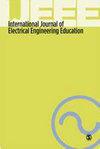采用仿真优化方法设计高效、紧凑的WPT接收天线
Q2 Social Sciences
International Journal of Electrical Engineering Education
Pub Date : 2021-03-27
DOI:10.1177/0020720921989014
引用次数: 1
摘要
本文提出了一种采用高q因子柔性印刷电路板(FPCB)的高效率、紧凑型无线电力传输(WPT)接收天线。所提出的高效、紧凑的WPT接收天线由螺旋结构、集总单元和穿地结构组成。本文为了设计一种小型化的高效WPT接收天线,采用机器学习技术对影响Q因子的天线方向图进行优化设计。设计的接收天线具有高Q特性,提高了无线电力传输效率。谐振频率为110 MHz,距离为10 mm的功率传输效率在88%以上。接收天线尺寸为30 × 40mm, NFC天线尺寸为20 × 30mm。利用机器学习技术设计制作了WPT接收天线和NFC天线的复合模块。与普通接收天线的实验结果比较,证实了该天线在传输效率上的提高。本文章由计算机程序翻译,如有差异,请以英文原文为准。
High-efficiency and compact WPT receiving antenna design using simulation optimization method
In this paper, a high-efficiency and compact wireless power transfer (WPT) receiving antenna using an flexible printed circuits board (FPCB) with high-Q factor is proposed. The proposed high-efficiency and compact WPT receiving antenna consists of a spiral structure, a lumped element and via through the ground structure. In this paper, in order to design a miniaturized high-efficiency WPT receiving antenna, machine learning technology was used to optimally design the antenna pattern that affects the Q factor. The designed receiving antenna has improved wireless power transmission efficiency with high Q characteristics. The power transfer efficiency is above 88% from distance 10 mm and the resonant frequency is 110 MHz. The sizes of the receiving antenna and the NFC antenna are 30 × 40 mm and 20 × 30 mm, respectively. Machine learning was used to design and fabricate the composite module of a WPT receiving antenna and NFC antenna. Comparison of the experimental results of the proposed receiving antenna with a general receiving antenna confirms the improvement in transmission efficiency.
求助全文
通过发布文献求助,成功后即可免费获取论文全文。
去求助
来源期刊
CiteScore
2.90
自引率
0.00%
发文量
0
审稿时长
>12 weeks
期刊介绍:
The International Journal of Electrical Engineering Education''s origins date back to 1948, when the world’s first stored-programme digital computer ran at the University of Manchester. In 1963, the Bulletin of Electrical Engineering Education evolved into the International Journal of Electrical Engineering Education (IJEEE).

 求助内容:
求助内容: 应助结果提醒方式:
应助结果提醒方式:


